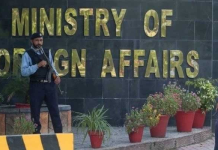KARACHI, OCT 29 /DNA/ – Advisor to Finance Minister, Khurram Schehzad, inaugurated the 5th Pakistan Future of Retail Business Summit and Expo held in Karachi on Wednesday. The theme of this year’s event was “Retail in a Changing World: Building Resilience in Pakistan’s Commerce.”
Addressing the inaugural session as Chief Guest, Khurram Schehzad highlighted the government’s comprehensive reform agenda focused on stabilizing the economy, broadening the tax base, promoting digital inclusion, and accelerating the transition towards a cashless economy.
He said that the government’s policies are geared towards creating a transparent, documented, and growth-oriented economy that supports business confidence, industrial revival, and long-term investment.
Mr. Schehzad remarked that Pakistan’s consumption-driven economy should be viewed as an opportunity for expansion rather than a constraint. “With a young and spending-oriented population, Pakistan offers vast potential for producers and retailers to grow and innovate,” he said.
He noted that the government has successfully reduced inflation to an average of 5 percent, marking a significant improvement compared to the past two years. This progress, he added, reflects the Prime Minister’s resolve to lower the cost of doing business, introduce affordable energy rates with certainty, and stimulate industrial activity. “Reforms in taxation, energy pricing, and inter-provincial trade are now showing tangible results,” he stated.
Mr. Schehzad further said that under the direct supervision of Prime Minister Shehbaz Sharif and under the leadership of Finance Minister Senator Muhammad Aurangzeb, the Cashless Pakistan Initiative is driving the country’s transition towards a digital and documented economy that will unlock substantial value and efficiency gains.
He noted that a large share of transactions in Pakistan still occurs in cash, and that Pakistan’s undocumented economy is estimated at around 40 percent of GDP, leading to inefficiencies and revenue leakages. “Digitizing even a modest portion of cash transactions could save the country approximately PKR 164 billion annually, while reducing the undocumented economy by 25 percent could unlock over PKR 1 trillion in additional resources,” he explained.
He added that the government’s cashless transition is built on three key verticals: 1) Conversion, 2) Inclusion, and 3) Adoption, which together aim to bring the informal economy into the formal system.
Conversion focuses on shifting existing cash-based transactions by the Government (local, provincial, federal) into digital channels
Inclusion ensures that all citizens, especially women and underbanked groups, have access to financial services; and, Adoption promotes the use of digital payments across businesses, public institutions, and consumers.
These pillars of the Cashless Pakistan framework are also essential to expanding transparency, accountability, and trust in the financial system,” he noted.
Highlighting the key targets of the initiative, Mr. Schehzad said that the number of monthly active Raast QR merchants will increase from 500,000 to 2 million by June 2026, annual digital transactions will double from 7.5 billion to 15 billion by the same period, and 100 percent of government payments, both government-to-person and person-to-government, will be digitized by December 2026. In addition, internet penetration will rise from 60 percent to 80 percent by the end of 2026, laying the foundation for an inclusive digital economy.
He mentioned that the government has already achieved major milestones under the initiative. Ten million full-mandate bank accounts have been opened for BISP women beneficiaries, Raast QR payments have been launched at NADRA offices and retail outlets in Islamabad, and Raast integration has been completed on gas and electricity bills covering nearly twelve million consumers. Moreover, Raast Payments Pakistan has been established as a dedicated entity for digital payment proliferation, while right-of-way charges on internet infrastructure have been abolished nationwide to reduce costs and expand connectivity.
“These efforts are transforming Pakistan into a digitally enabled, transparent, and inclusive economy,” Mr. Schehzad said, adding that the government has also separated tax policy formulation from tax collection to enhance institutional efficiency. The Finance Division now oversees policy design and framework development, while the Federal Board of Revenue focuses on implementation and collection.
Mr. Schehzad reaffirmed that the government’s approach combines macroeconomic discipline with technological modernization to create a resilient and forward-looking economy. “Through fiscal reforms, energy rationalization, and digital transformation, Pakistan is positioning itself as a competitive hub for trade, retail, and investment in the region,” he emphasized.
















